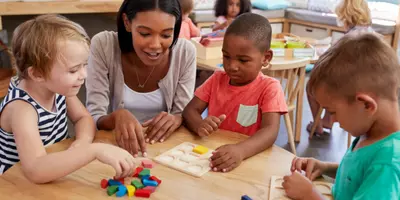
Aug 7, 2019 ● Eric Titner
How to answer 3 common questions asked in a teacher interview
Attention teachers: are you on the job hunt trail and want to make sure that you’re as successful on interviews as you are in the classroom? The truth is, today’s job market is as competitive as it gets—even for teachers—and when you’re looking for a new position, chances are you’re going to face some stiff competition from other teachers who are just as qualified and capable. In the face of such a challenging environment, hiring decisions often come down to who handles themselves best during interviews.
For better or for worse, interviews are a bit like class exams—we can practice and prepare with the very best of intentions, but because we don’t know exactly what will be asked there’s always an anxiety-producing element that all of our hard work will be for nothing.
That said, we’re not advocating for a “no prep” approach when going on interviews. There’s plenty you can do to help ensure that you present yourself in the best way possible and make a great impression. This includes getting familiar with common questions that are often asked during teacher interviews, and how to attack them successfully. Let’s take a closer look at some of these.
1. What is your preferred teaching style?
This is an extremely common interview question and is designed to help showcase your passion. Are you in the classroom simply to drive students to perform on exams and assignments so that you look good, or are you eager to motivate students to do their best and realize what they’re capable of, and inspire them to discover what’s possible—both inside and outside of the classroom? Here’s your chance to demonstrate what being in the classroom and being charged with the power and responsibility of molding young minds mean to you.
Here’s one way to tackle this question:
I never take a one-size-fits-all approach to working with my students. Every student is a unique individual with their own strengths, interests, and style of learning that works best for them, and I consider devoting my time and energy to discovering how best to reach each of them an important investment. The lessons, activities, and assessments that I develop for my students are designed to support this philosophy.
2. Recount how you handled a particularly difficult situation.
This is a popular question at interviews for all professions, and for good reason. It’s designed to help gauge your ability to stay cool, calm, and collected in a storm and to navigate your way out of a stressful and challenging situation effectively. This is especially important as a teacher, when young and impressionable minds are involved and on the line. Because every teacher’s example of a challenging situation is different, answers to this question will vary greatly—but the key to answering this question is to avoid assigning blame externally and instead focus on what proactive steps you took to affect positive and lasting change.
This is especially true if the situation you’re describing involves a student. You want to make sure that you refrain from labeling the student as unteachable or a problem and instead focus on the efforts you made to reach them on their own terms—focusing on their strengths and interests, providing them with additional support and encouragement, reaching out to parents and caregivers, and modulating your approach as needed in an effort to turn a challenging situation into a success story.
3. What key attributes help make you a successful teacher?
This question is designed to help show interviewers that you know what teaching abilities and personality traits are typically needed to be successful in the classroom. Employers looking to hire intuitive and skilled educators are really going to be interested in how you handle this question.
Here’s one potential answer:
I think that being in confident command of the subject material being taught is important before ever stepping into a classroom—nothing represents more of a disservice to young minds than an unprepared teacher. When I do enter the classroom, I’m passionate about the goal of motivating and inspiring young minds and helping them to discover new things about the world around them. I’m aware that each student is unique and I think that having the patience and flexibility to work with each of them by drawing upon their strengths and attributes is essential.
Students are excellent at detecting whether others truly care, and I never forget this. I also believe that my ability to embrace a holistic teamwork approach—working collaboratively with students, their other teachers, and their caregivers to help students reach their full potential—is important. And I also believe that my level of accountability is a powerful tool—whenever I face a challenging situation involving a student I always think about ways that I can do my job better, to help reach them more effectively and make every classroom experience successful.
Here’s the bottom line: Even teachers can learn something new, and this includes the time they spend outside of the classroom and on the job hunt. If you want to succeed in interviews and get the opportunity to use your skills and expertise in the classroom, then make sure you’re handling the interview questions you’re to likely encounter effectively.


